عيونِك شوكةٌ في القلبِ[1]
توجعني... وأعبدُها
وأحميها من الريحِ
وأُغمدها وراء الليل والأوجاع... أُغمدها
فيشعل جُرحُها ضوءَ المصابيحِ
ويجعل حاضري غدُها
أعزَّ عليَّ من روحي
وأنسى، بعد حينٍ، في لقاء العين بالعينِ
بأنّا مرة كنّا، وراءَ الباب، اثنين !
كلامُكِ... كان أغنيهْ
وكنت أُحاول الإنشاد
ولكنَّ الشقاء أحاط بالشفة الربيعيَّة
كلامك، كالسنونو، طار من بيتي
فهاجر باب منزلنا، وعتبتنا الخريفيَّه
وراءك، حيث شاء الشوقُ....
وانكسرت مرايانا
فصار الحزن ألفينِ
ولملمنا شظايا الصوت...
لم نتقن سوى مرثيَّة الوطنِ!
سنزرعها معاً في صدر جيتارِ
وفق سطوح نكبتنا، سنعرفها
لأقمارٍ مشوَّهةٍ...وأحجارِ
ولكنّي نسيتُ... نسيتُ... يا مجهولةَ الصوتِ:
رحيلك أصدأ الجيتار... أم صمتي؟!
رأيتُك أمسِ في الميناءْ
مسافرة بلا أهل... بلا زادِ
ركضتُ إليكِ كالأيتامُ ،
أسأل حكمة الأجداد:
لماذا تُسحبُ البيَّارة الخضراءْ
إلى سجن، إلى منفى، إلى ميناءْ
وتبقى، رغم رحلتها
ورغم روائح الأملاح والأشواق،
تبقى دائماً خضراء؟
وأكتب في مفكرتي:
أُحبُّ البرتقال . وأكرهُ الميناء
وأَردف في مفكرتي :
على الميناء
وقفتُ. وكانت الدنيا عيونَ شتاءْ
وقشر البرتقال لنا. وخلفي كانت الصحراء!
رأيتُكِ في جبال الشوك
راعيةً بلا أغنام
مطارَدةً، وفي الأطلال...
وكنت حديقتي، وأنا غريب الدّار
أدقُّ الباب يا قلبي
على قلبي...
يقرم الباب والشبّاك والإسمنت والأحجار!
رأيتكِ في خوابي الماء والقمحِ
محطَّمةً. رأيتك في مقاهي الليل خادمةً
رأيتك في شعاع الدمع والجرحِ.
وأنتِ الرئة الأخرى بصدري...
أنتِ أنتِ الصوتُ في شفتي....
وأنتِ الماء، أنتِ النار!
رأيتكِ عند باب الكهف... عند النار
مُعَلَّقَةً على حبل الغسيل ثيابَ أيتامك
رأيتك في المواقد... في الشوارع...
في الزرائب... في دمِ الشمسِ
رأيتك في أغاني اليُتم والبؤسِ!
رأيتك ملء ملح البحر والرملِ
وكنتِ جميلة كالأرض... كالأطفال... كالفلِّ
وأُقسم:
من رموش العين سوف أُخيط منديلا
وأنقش فوقه شعراً لعينيكِ
واسما حين أسقيه فؤاداً ذاب ترتيلا...
يمدُّ عرائش الأيكِ...
سأكتب جملة أغلى من الشُهَدَاء والقُبَلِ:
"!فلسطينيةً كانتِ. ولم تزلِ"
فتحتُ الباب والشباك في ليل الأعاصيرِ
على قمرٍ تصلَّب في ليالينا
وقلتُ لليلتي: دوري!
وراء الليل والسورِ
فلي وعد مع الكلمات والنورِ
وأنتِ حديقتي العذراءُ....
ما دامت أغانينا
سيوفاً حين نشرعها
وأنتِ وفيَّة كالقمح...
ما دامت أغانينا
سماداً حين نزرعها
وأنت كنخلة في البال ،
ما انكسرتْ لعاصفةٍ وحطّابِ
وما جزَّت ضفائرَها
وحوشُ البيد والغابِ....
ولكني أنا المنفيُّ خلف السور والبابِ
خُذينيَ تحت عينيكِ
خذيني، أينما كنتِ
خذيني، كيفما كنتِ
أردِّ إليَّ لون الوجه والبدنِ
وضوء القلب والعينِ
وملح الخبز واللحنِ
وطعم الأرض والوطنِ!
خُذيني تحت عينيكِ
خذيني لوحة زيتيَّةً في كوخ حسراتِ
خذيني آيةً من سفر مأساتي
خذيني لعبة... حجراً من البيت
ليذكر جيلُنا الآتي
مساربه إلى البيتِ !
فلسطينيةَ العينين والوشمِ
فلسطينية الاسم
فلسطينية الأحلام والهمِّ
فلسطينية المنديل والقدمَين والجسمِ
فلسطينية الكلمات والصمتِ
فلسطينية الصوتِ
فلسطينية الميلاد والموتِ
حملتُك في دفاتريَ القديمةِ
نار أشعاري
حملتُك زادَ أسفاري
وباسمك ، صحتُ في الوديانْ :
خيولُ الروم !... أعرفها
وإن يتبدَّل الميدان !
خُذُوا حَذَراً
من البرق الذي صكَّته أُغنيتي على الصوَّانْ
أنا زينُ الشباب ، وفارس الفرسانْ
أنا. ومحطِّم الأوثانْ .
حدود الشام أزرعها
قصائد تطلق العقبان !
وباسمك ، صحت بالأعداءْ :
كلي لحمي إذا نمت يا ديدانْ
فبيض النمل لا يلد النسورَ
وبيضةُ الأفعى..
يخبئ قشرُها ثعبانْ !
خيول الروم ... أعرفها
وأعرف قبلها أني
أنا زينُ الشباب، وفارس الفرسان
توجعني... وأعبدُها
وأحميها من الريحِ
وأُغمدها وراء الليل والأوجاع... أُغمدها
فيشعل جُرحُها ضوءَ المصابيحِ
ويجعل حاضري غدُها
أعزَّ عليَّ من روحي
وأنسى، بعد حينٍ، في لقاء العين بالعينِ
بأنّا مرة كنّا، وراءَ الباب، اثنين !
كلامُكِ... كان أغنيهْ
وكنت أُحاول الإنشاد
ولكنَّ الشقاء أحاط بالشفة الربيعيَّة
كلامك، كالسنونو، طار من بيتي
فهاجر باب منزلنا، وعتبتنا الخريفيَّه
وراءك، حيث شاء الشوقُ....
وانكسرت مرايانا
فصار الحزن ألفينِ
ولملمنا شظايا الصوت...
لم نتقن سوى مرثيَّة الوطنِ!
سنزرعها معاً في صدر جيتارِ
وفق سطوح نكبتنا، سنعرفها
لأقمارٍ مشوَّهةٍ...وأحجارِ
ولكنّي نسيتُ... نسيتُ... يا مجهولةَ الصوتِ:
رحيلك أصدأ الجيتار... أم صمتي؟!
رأيتُك أمسِ في الميناءْ
مسافرة بلا أهل... بلا زادِ
ركضتُ إليكِ كالأيتامُ ،
أسأل حكمة الأجداد:
لماذا تُسحبُ البيَّارة الخضراءْ
إلى سجن، إلى منفى، إلى ميناءْ
وتبقى، رغم رحلتها
ورغم روائح الأملاح والأشواق،
تبقى دائماً خضراء؟
وأكتب في مفكرتي:
أُحبُّ البرتقال . وأكرهُ الميناء
وأَردف في مفكرتي :
على الميناء
وقفتُ. وكانت الدنيا عيونَ شتاءْ
وقشر البرتقال لنا. وخلفي كانت الصحراء!
رأيتُكِ في جبال الشوك
راعيةً بلا أغنام
مطارَدةً، وفي الأطلال...
وكنت حديقتي، وأنا غريب الدّار
أدقُّ الباب يا قلبي
على قلبي...
يقرم الباب والشبّاك والإسمنت والأحجار!
رأيتكِ في خوابي الماء والقمحِ
محطَّمةً. رأيتك في مقاهي الليل خادمةً
رأيتك في شعاع الدمع والجرحِ.
وأنتِ الرئة الأخرى بصدري...
أنتِ أنتِ الصوتُ في شفتي....
وأنتِ الماء، أنتِ النار!
رأيتكِ عند باب الكهف... عند النار
مُعَلَّقَةً على حبل الغسيل ثيابَ أيتامك
رأيتك في المواقد... في الشوارع...
في الزرائب... في دمِ الشمسِ
رأيتك في أغاني اليُتم والبؤسِ!
رأيتك ملء ملح البحر والرملِ
وكنتِ جميلة كالأرض... كالأطفال... كالفلِّ
وأُقسم:
من رموش العين سوف أُخيط منديلا
وأنقش فوقه شعراً لعينيكِ
واسما حين أسقيه فؤاداً ذاب ترتيلا...
يمدُّ عرائش الأيكِ...
سأكتب جملة أغلى من الشُهَدَاء والقُبَلِ:
"!فلسطينيةً كانتِ. ولم تزلِ"
فتحتُ الباب والشباك في ليل الأعاصيرِ
على قمرٍ تصلَّب في ليالينا
وقلتُ لليلتي: دوري!
وراء الليل والسورِ
فلي وعد مع الكلمات والنورِ
وأنتِ حديقتي العذراءُ....
ما دامت أغانينا
سيوفاً حين نشرعها
وأنتِ وفيَّة كالقمح...
ما دامت أغانينا
سماداً حين نزرعها
وأنت كنخلة في البال ،
ما انكسرتْ لعاصفةٍ وحطّابِ
وما جزَّت ضفائرَها
وحوشُ البيد والغابِ....
ولكني أنا المنفيُّ خلف السور والبابِ
خُذينيَ تحت عينيكِ
خذيني، أينما كنتِ
خذيني، كيفما كنتِ
أردِّ إليَّ لون الوجه والبدنِ
وضوء القلب والعينِ
وملح الخبز واللحنِ
وطعم الأرض والوطنِ!
خُذيني تحت عينيكِ
خذيني لوحة زيتيَّةً في كوخ حسراتِ
خذيني آيةً من سفر مأساتي
خذيني لعبة... حجراً من البيت
ليذكر جيلُنا الآتي
مساربه إلى البيتِ !
فلسطينيةَ العينين والوشمِ
فلسطينية الاسم
فلسطينية الأحلام والهمِّ
فلسطينية المنديل والقدمَين والجسمِ
فلسطينية الكلمات والصمتِ
فلسطينية الصوتِ
فلسطينية الميلاد والموتِ
حملتُك في دفاتريَ القديمةِ
نار أشعاري
حملتُك زادَ أسفاري
وباسمك ، صحتُ في الوديانْ :
خيولُ الروم !... أعرفها
وإن يتبدَّل الميدان !
خُذُوا حَذَراً
من البرق الذي صكَّته أُغنيتي على الصوَّانْ
أنا زينُ الشباب ، وفارس الفرسانْ
أنا. ومحطِّم الأوثانْ .
حدود الشام أزرعها
قصائد تطلق العقبان !
وباسمك ، صحت بالأعداءْ :
كلي لحمي إذا نمت يا ديدانْ
فبيض النمل لا يلد النسورَ
وبيضةُ الأفعى..
يخبئ قشرُها ثعبانْ !
خيول الروم ... أعرفها
وأعرف قبلها أني
أنا زينُ الشباب، وفارس الفرسان
[1] Transliteration / traslitterazione
Eywnik shwkt fi alqlb
Tawjaeni... Waebduha
Wa'ahmiha min alryh
W'ughmdha wara' allayl wal'awjaea... 'Ughmdha
Fayasheal jurhuha dw' almsabyh
Wayajeal hadiri ghduha aeza
Elya min ruwhi
Wa'ansaa, baed hynin, fi liqa' aleayn
Baleyn banna maratan knna, wra' albab, athnyn !
Klamuki... Kan aghnyh
Wakunt 'uhawl al'iinshad
Wlkna alshiqa' 'ahat bialshifat alrbyeya
Kalaamuka, kalasnunu, tar min bayti
Fhajr bab munzilna,
Waeatbatana alkhryfyah
Wara'aka, hayth sha' alshwqu....
Wankasarat marayana
Fasar alhuzn alfyn
Walamulmina shazaya alsuwta...
Lm natqin siwaa mrthyat alwtni!
Sanazrieuha meaan fi sadar jytar
Wfq sutuh nukbatuna, sanaerifuha
Laqmar mshwahtin...wahjar
Wlknny nsytu... Nsytu... Ya mjhwlt alswti:
Rahiluk 'asda aljitar... 'Am simty?!
Raytuk ams fi almyna'
Musafirat bila 'ahla... Bila zad
Rkdt 'ilyk kalaytam ,
'As'al hikmat al'ajdad:
Limadha tushb albyaart alkhdra'
'Iilaa sijnin, 'iilaa manafaa، 'iilaa myna'
Watabqaa, raghm rihlataha
Waraghm rawayih al'amlah wal'ashwaqi,
tabqaa daymaan khadra'?
Wa'aktub fi mafkiriti:
'Uhbu alburtuqal . Wakrh almina'
W'ardf fi mufakarati :
Ealaa almina'
Wqftu. Wakanat aldunya eywn shta'
Waqashr alburtaqal lana. Wakhilafi kanat alsahra'a!
Raytuk fi jibal alshuk
Raeytan bila 'aghnam
Mtaradtan, wafi al'atlala...
Wakunt hadiqati, wa'ana ghurayb
Alddar adqu albab ya qalbi
Ealaa qalby...
Yuqrim albab walshbbak wal'iisminat wal'ahjara!
Raytk fi khawabi alma' walqmh
Mhtamtan. Ra'ayatak fi maqahi allayl khadmtan
Ra'aytak fi shieae aldame waljrhi.
Want alriyat al'ukhraa bisidri...
Ant ant alswt fi shufti....
Want alma'i, ant alnaara!
Raytk eind bab alkahif... Eind alnaar
Muealaqatan ealaa habl alghasil thyab 'aytamik
Ra'aytak fi almawaqada... Fi alshawariea... Fi alzarayib...fi dm alshms
Ra'aytak fi 'aghani alyutm walbwsi!
Ra'ayatk mil' milh albahr walrml
Wknt jamilatan kal'arda... Kal'atfala... Kalfli
W'uqsm:
Min rmush aleayn sawf 'ukhyt mandilaan
Wa'anqash fawqih sheraan leynyk
Wasma hin 'asqih fwadaan dhab tartayla...
Ymdu earayish alayki...
Sa'aktab jumlat 'aghlaa min alshuhada' walqubali:
"!Flstynytan kanti. Walam tzli"
Ftht albab walshibak fi layl alaeasyr
Ealaa qmr tslab fi layalina
Wqlt lilylati: duri!
Wara' allayl walswr
Fali waead mae alkalimat
Walnwr want hadiqati aledhra'u....
Ma damat 'aghanina
Sywfaan hin nasharaeuha
Want wfyat kalqamha...
Ma damat 'aghanina smadaan hin nazraeuha
Wa'ant kanakhlat fi albal ,
Ma anksrt leasft whttab
Wama jzat dfayraha
Whwsh albayd walghabi....
Walikuniy 'ana almnfyu khalf alsuwr walbab
Khudhyny taht eynyk
Khadhini, 'aynama knt
Khadhini, kayfima knt
Ardi 'ilya lawn alwajh walbdn
Wadu' alqalb waleyn
Wamalah alkhubz wallhn
Watiem al'ard walwtni!
Khudhyny taht eynyk
Khadhini lawhatan zytyatan fi kukh hsrat
Khadhiani aytan min safar maasati
Khadhini laebata... Hjraan min albayt
Liudhkir jyluna alati
Masaribuh 'iilaa albyt !
Flstynyt aleaynayn walwshm
Filastiniat alaism
Filastiniat al'ahlam walhmi
Filastiniat almandil walqdmayn waljsm
Filastiniat alkalimat walsmt
Filastiniat alswt
Filastiniat almilad walmwt
Hmltuk fi dfatry alqdym
Nar 'asheariun
Hmltuk zad 'asfari
Wabaismik , sht fi alwdyan :
Khywl alruwm !... 'Aerifuha
Wa'iin ytbdal almidan !
Khudhuu hadharaan
Min albarq aldhy skath 'ughnyty ealaa alswaan
'Ana zyn alshabab , wafaris alfrsan
'Ana. Wmhtim alawthan .
Hudud alshshami 'azraeuha
Qasayid tutliq aleuqban !
Wabaismik , saht balaeda' :
Kuli lahmi 'iidha namat ya dydan
Fbyd alnaml la yalidu alnswr
Wbydt al'afeaa..
Yukhbi qshruha theban !
Khuyul alruwm ... 'Aerifuha
Wa'aeraf qabliha 'aniy
'Ana zyn alshabab, wafaris alfursan.
Eywnik shwkt fi alqlb
Tawjaeni... Waebduha
Wa'ahmiha min alryh
W'ughmdha wara' allayl wal'awjaea... 'Ughmdha
Fayasheal jurhuha dw' almsabyh
Wayajeal hadiri ghduha aeza
Elya min ruwhi
Wa'ansaa, baed hynin, fi liqa' aleayn
Baleyn banna maratan knna, wra' albab, athnyn !
Klamuki... Kan aghnyh
Wakunt 'uhawl al'iinshad
Wlkna alshiqa' 'ahat bialshifat alrbyeya
Kalaamuka, kalasnunu, tar min bayti
Fhajr bab munzilna,
Waeatbatana alkhryfyah
Wara'aka, hayth sha' alshwqu....
Wankasarat marayana
Fasar alhuzn alfyn
Walamulmina shazaya alsuwta...
Lm natqin siwaa mrthyat alwtni!
Sanazrieuha meaan fi sadar jytar
Wfq sutuh nukbatuna, sanaerifuha
Laqmar mshwahtin...wahjar
Wlknny nsytu... Nsytu... Ya mjhwlt alswti:
Rahiluk 'asda aljitar... 'Am simty?!
Raytuk ams fi almyna'
Musafirat bila 'ahla... Bila zad
Rkdt 'ilyk kalaytam ,
'As'al hikmat al'ajdad:
Limadha tushb albyaart alkhdra'
'Iilaa sijnin, 'iilaa manafaa، 'iilaa myna'
Watabqaa, raghm rihlataha
Waraghm rawayih al'amlah wal'ashwaqi,
tabqaa daymaan khadra'?
Wa'aktub fi mafkiriti:
'Uhbu alburtuqal . Wakrh almina'
W'ardf fi mufakarati :
Ealaa almina'
Wqftu. Wakanat aldunya eywn shta'
Waqashr alburtaqal lana. Wakhilafi kanat alsahra'a!
Raytuk fi jibal alshuk
Raeytan bila 'aghnam
Mtaradtan, wafi al'atlala...
Wakunt hadiqati, wa'ana ghurayb
Alddar adqu albab ya qalbi
Ealaa qalby...
Yuqrim albab walshbbak wal'iisminat wal'ahjara!
Raytk fi khawabi alma' walqmh
Mhtamtan. Ra'ayatak fi maqahi allayl khadmtan
Ra'aytak fi shieae aldame waljrhi.
Want alriyat al'ukhraa bisidri...
Ant ant alswt fi shufti....
Want alma'i, ant alnaara!
Raytk eind bab alkahif... Eind alnaar
Muealaqatan ealaa habl alghasil thyab 'aytamik
Ra'aytak fi almawaqada... Fi alshawariea... Fi alzarayib...fi dm alshms
Ra'aytak fi 'aghani alyutm walbwsi!
Ra'ayatk mil' milh albahr walrml
Wknt jamilatan kal'arda... Kal'atfala... Kalfli
W'uqsm:
Min rmush aleayn sawf 'ukhyt mandilaan
Wa'anqash fawqih sheraan leynyk
Wasma hin 'asqih fwadaan dhab tartayla...
Ymdu earayish alayki...
Sa'aktab jumlat 'aghlaa min alshuhada' walqubali:
"!Flstynytan kanti. Walam tzli"
Ftht albab walshibak fi layl alaeasyr
Ealaa qmr tslab fi layalina
Wqlt lilylati: duri!
Wara' allayl walswr
Fali waead mae alkalimat
Walnwr want hadiqati aledhra'u....
Ma damat 'aghanina
Sywfaan hin nasharaeuha
Want wfyat kalqamha...
Ma damat 'aghanina smadaan hin nazraeuha
Wa'ant kanakhlat fi albal ,
Ma anksrt leasft whttab
Wama jzat dfayraha
Whwsh albayd walghabi....
Walikuniy 'ana almnfyu khalf alsuwr walbab
Khudhyny taht eynyk
Khadhini, 'aynama knt
Khadhini, kayfima knt
Ardi 'ilya lawn alwajh walbdn
Wadu' alqalb waleyn
Wamalah alkhubz wallhn
Watiem al'ard walwtni!
Khudhyny taht eynyk
Khadhini lawhatan zytyatan fi kukh hsrat
Khadhiani aytan min safar maasati
Khadhini laebata... Hjraan min albayt
Liudhkir jyluna alati
Masaribuh 'iilaa albyt !
Flstynyt aleaynayn walwshm
Filastiniat alaism
Filastiniat al'ahlam walhmi
Filastiniat almandil walqdmayn waljsm
Filastiniat alkalimat walsmt
Filastiniat alswt
Filastiniat almilad walmwt
Hmltuk fi dfatry alqdym
Nar 'asheariun
Hmltuk zad 'asfari
Wabaismik , sht fi alwdyan :
Khywl alruwm !... 'Aerifuha
Wa'iin ytbdal almidan !
Khudhuu hadharaan
Min albarq aldhy skath 'ughnyty ealaa alswaan
'Ana zyn alshabab , wafaris alfrsan
'Ana. Wmhtim alawthan .
Hudud alshshami 'azraeuha
Qasayid tutliq aleuqban !
Wabaismik , saht balaeda' :
Kuli lahmi 'iidha namat ya dydan
Fbyd alnaml la yalidu alnswr
Wbydt al'afeaa..
Yukhbi qshruha theban !
Khuyul alruwm ... 'Aerifuha
Wa'aeraf qabliha 'aniy
'Ana zyn alshabab, wafaris alfursan.
inviata da Riccardo Gullotta - 9/4/2021 - 18:31
Lingua: Inglese
VERSION #1
English translation / الترجمة الإنجليزية / Traduzione inglese / Traduction anglaise/ תרגום לאנגלית / Englanninkielinen käännös :
Abdelwahab M Elmessiri from The Palestinian wedding : a bilingual anthology of contemporary Palestinian resistance poetry, Washington, D.C. : Three Continents Press, ©1982.
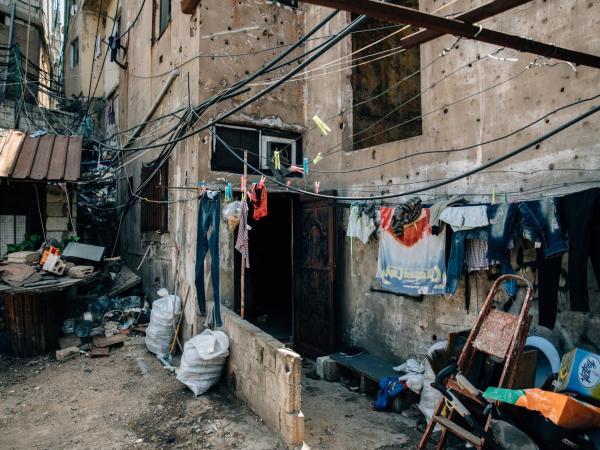
English translation / الترجمة الإنجليزية / Traduzione inglese / Traduction anglaise/ תרגום לאנגלית / Englanninkielinen käännös :
Abdelwahab M Elmessiri from The Palestinian wedding : a bilingual anthology of contemporary Palestinian resistance poetry, Washington, D.C. : Three Continents Press, ©1982.

Palestinian refugee camp Bourj El Barajneh in Lebanon photo credit @ Paddy Dowling – The Independent
A LOVER FROM PALESTINE
Your eyes are a thorn in my heart
Inflicting pain, yet I cherish that thorn
And shield it from the wind.
I sheathe it in my flesh, I sheathe it, protecting it from night and agony,
And its wound lights the lanterns,
Its tomorrow makes my present
Dearer to me than my soul.
And soon I forget, as eye meets eye,
That once, behind the doors, there were two of us !
Your words were a song
And I tried to sing, too,
But agony encircled the lips of spring.
And like the swallow, your words took wing,
The door of our home and the autumnal threshold migrated,
To follow you wherever led by longing
Our mirrors were shattered,
And sorrow was multiplied a thousand fold.
And we gathered the splinters of sound,
Mastering only the elegy of our homeland!
Together were will plant it in the heart of a lyre,
And on the rooftops of our tragedy we’ll play it
To mutilated moons and to stones.
But I have forgotten, you of the unknown voice:
Was it your departure that rushed the lyre or was it my silence?
Yesterday I saw you in the port,
A long voyager without provisions,
Like an orphan I ran to you,
Asking the wisdom of our forefathers:
How can the ever-verdant orange grove be dragged
To prison, to exile, to a port,
And despite all her travels,
Despite the scent of salt and longing,
Remain evergreen?
I write in my diary:
I love oranges and hate the port
And I write further:
On the dock
I stood, and saw the world through Witter’s eyes
Only the orange peel is ours, and behind me lay the desert.
In the briar-covered mountains I saw you,
A shepherdess without sheep,
Pursued among the ruins.
You were my garden, and I a stranger,
Knocking at the door, my heart,
For upon my heart stand firm
The door and windows, the cement and stones.
I have seen you in casks of water, in granaries,
Broken, I have seen you a maid in night clubs,
I have seen you in the gleam of tears and in wounds.
You are the other lung in my chest;
You are the sound on my lips;
You are water; you are fire.
I saw you at the mouth of the cave, at the cavern,
Hanging your orphans’ rags on the wash line.
In the stoves, in the streets I have seen you.
In the barns and in the sun’s blood.
In the songs of the orphaned and the wretched I have seen you.
I have seen you in the salt of the sea and in the sand.
Yours was the beauty of the earth, of children and of Arabian jasmine.
And I have vowed
To fashion from my eyelashes a kerchief,
And upon it to embroider verses for your eyes,
And a name, when watered by a heart that dissolves in chanting,
Will make the sylvan arbours grow.
I shall write a phrase more precious than honey and kisses:
‘Palestinian she was and still is’.
On a night of storms, I opened the door and the window
To see the hardened moon of our nights.
I said to the night: Run out,
Beyond the darkness and the wall;
I have a promise to keep with words and light.
You are my virgin garden
As long as our songs
Are swords when we draw them.
And you are as faithful as grain
So long as our songs
Keep alive the fertile soil when we plant them.
You are like a palm tree in the mind:
Neither storm nor woodsman’s ax can fell it.
Its braids uncut
By the beasts of desert and forest.
But I am the exiled one behind wall and door,
Shelter me in the warmth of your gaze.
Take me, wherever you are,
Take me, however you are.
To be restored to the warmth of face and body,
To the light of heart and eye,
To the salt of bread and song,
To the taste of earth and homeland.
Shelter me in the warmth of your gaze,
Take me, a panel of almond wood, in the cottage of sorrows,
Take me, a verse from the book of my tragedy,
Take me, a plaything or a stone from the house,
So that our next generation may recall
The path of return to our home.
Her eyes and the tattoo on her hands are Palestinian,
Her name, Palestinian,
Her dreams, and sorrow, Palestinian,
Her Kerchief, her feet and body, Palestinian,
Her words and her silence, Palestinian,
Her voice, Palestinian,
Her birth and her death, Palestinian,
I have carried you in my old notebooks
As the fire of my verses,
The sustenance for my journeys.
In your name, my voice rang in the valleys:
I have seen Byzantium’s horses
Even though the battle be different.
Beware, oh beware
The lightning struck by my song in the granite.
I am the flower of youth and the knight of knights!
I am the smasher of idols.
I plant the Levantine borders
With poems that set eagles free.
And in your name I have shouted at the enemy:
Worms, feed on my flesh if ever I slumber,
For the eggs of ants cannot hatch eagles,
And the shell of the adder’s egg
Holds but a snake!
I have seen Byzantium’s horses,
And before it all, I know
That I am the flower of youth and the knight of knights!
Your eyes are a thorn in my heart
Inflicting pain, yet I cherish that thorn
And shield it from the wind.
I sheathe it in my flesh, I sheathe it, protecting it from night and agony,
And its wound lights the lanterns,
Its tomorrow makes my present
Dearer to me than my soul.
And soon I forget, as eye meets eye,
That once, behind the doors, there were two of us !
Your words were a song
And I tried to sing, too,
But agony encircled the lips of spring.
And like the swallow, your words took wing,
The door of our home and the autumnal threshold migrated,
To follow you wherever led by longing
Our mirrors were shattered,
And sorrow was multiplied a thousand fold.
And we gathered the splinters of sound,
Mastering only the elegy of our homeland!
Together were will plant it in the heart of a lyre,
And on the rooftops of our tragedy we’ll play it
To mutilated moons and to stones.
But I have forgotten, you of the unknown voice:
Was it your departure that rushed the lyre or was it my silence?
Yesterday I saw you in the port,
A long voyager without provisions,
Like an orphan I ran to you,
Asking the wisdom of our forefathers:
How can the ever-verdant orange grove be dragged
To prison, to exile, to a port,
And despite all her travels,
Despite the scent of salt and longing,
Remain evergreen?
I write in my diary:
I love oranges and hate the port
And I write further:
On the dock
I stood, and saw the world through Witter’s eyes
Only the orange peel is ours, and behind me lay the desert.
In the briar-covered mountains I saw you,
A shepherdess without sheep,
Pursued among the ruins.
You were my garden, and I a stranger,
Knocking at the door, my heart,
For upon my heart stand firm
The door and windows, the cement and stones.
I have seen you in casks of water, in granaries,
Broken, I have seen you a maid in night clubs,
I have seen you in the gleam of tears and in wounds.
You are the other lung in my chest;
You are the sound on my lips;
You are water; you are fire.
I saw you at the mouth of the cave, at the cavern,
Hanging your orphans’ rags on the wash line.
In the stoves, in the streets I have seen you.
In the barns and in the sun’s blood.
In the songs of the orphaned and the wretched I have seen you.
I have seen you in the salt of the sea and in the sand.
Yours was the beauty of the earth, of children and of Arabian jasmine.
And I have vowed
To fashion from my eyelashes a kerchief,
And upon it to embroider verses for your eyes,
And a name, when watered by a heart that dissolves in chanting,
Will make the sylvan arbours grow.
I shall write a phrase more precious than honey and kisses:
‘Palestinian she was and still is’.
On a night of storms, I opened the door and the window
To see the hardened moon of our nights.
I said to the night: Run out,
Beyond the darkness and the wall;
I have a promise to keep with words and light.
You are my virgin garden
As long as our songs
Are swords when we draw them.
And you are as faithful as grain
So long as our songs
Keep alive the fertile soil when we plant them.
You are like a palm tree in the mind:
Neither storm nor woodsman’s ax can fell it.
Its braids uncut
By the beasts of desert and forest.
But I am the exiled one behind wall and door,
Shelter me in the warmth of your gaze.
Take me, wherever you are,
Take me, however you are.
To be restored to the warmth of face and body,
To the light of heart and eye,
To the salt of bread and song,
To the taste of earth and homeland.
Shelter me in the warmth of your gaze,
Take me, a panel of almond wood, in the cottage of sorrows,
Take me, a verse from the book of my tragedy,
Take me, a plaything or a stone from the house,
So that our next generation may recall
The path of return to our home.
Her eyes and the tattoo on her hands are Palestinian,
Her name, Palestinian,
Her dreams, and sorrow, Palestinian,
Her Kerchief, her feet and body, Palestinian,
Her words and her silence, Palestinian,
Her voice, Palestinian,
Her birth and her death, Palestinian,
I have carried you in my old notebooks
As the fire of my verses,
The sustenance for my journeys.
In your name, my voice rang in the valleys:
I have seen Byzantium’s horses
Even though the battle be different.
Beware, oh beware
The lightning struck by my song in the granite.
I am the flower of youth and the knight of knights!
I am the smasher of idols.
I plant the Levantine borders
With poems that set eagles free.
And in your name I have shouted at the enemy:
Worms, feed on my flesh if ever I slumber,
For the eggs of ants cannot hatch eagles,
And the shell of the adder’s egg
Holds but a snake!
I have seen Byzantium’s horses,
And before it all, I know
That I am the flower of youth and the knight of knights!
inviata da Riccardo Gullotta - 9/4/2021 - 19:43
Lingua: Inglese
VERSION #2
English translation / الترجمة الإنجليزية / Traduzione inglese / Traduction anglaise/ תרגום לאנגלית / Englanninkielinen käännös :
TNP
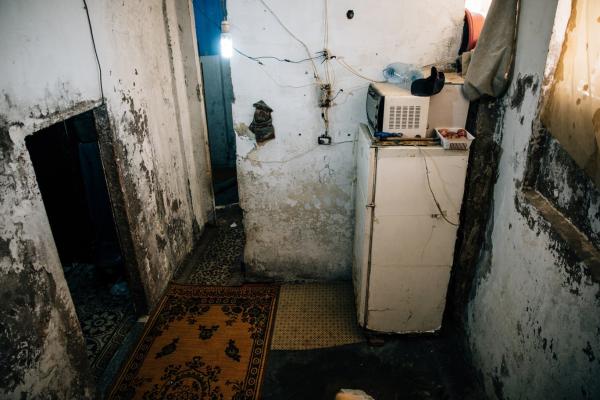
English translation / الترجمة الإنجليزية / Traduzione inglese / Traduction anglaise/ תרגום לאנגלית / Englanninkielinen käännös :
TNP

Palestinian refugee camp Bourj El Barajneh in Lebanon photo credit @ Paddy Dowling – The Independent
A LOVER FROM PALESTINE
A thorn in my heart
Painful yet adorable
I shield it from the wind
And stab it deep through the night
Through pain
Its wound illuminates the darkness
Transforms my present into future
Dearer than my soul
And I shall forget as our eyes meet
That once we were together behind the gate
Your words were my song
I tried singing
But winter replaced the spring
Your words, like the sparrow, flew away
Like the sparrow who left our doors
After you
Our mirrors broke-sorrows engulfed us
We picked the splinters of sound
And only learned to lament the Fatherland
We shall plant it together
Over the breast of a guitar
Play it over the roofs of our tragedy
To disfigured moons and rocks
But I have forgotten
I have forgotten your voice
Was it my silence
Was it my silence or
Your departure
That rusted my guitar?
I saw you last at the port
A lonely traveler without luggage
I ran to you like an orphan, a child
Seeking answers in ancestral wisdom:
How could the green orchard be imprisoned
Exiled, banished to a port
And still remain green
I entered in my diary
I love oranges
And hate the port
Where I stood
As torrents of rain poured down
We only had the orange peels
And behind us stretched the endless desert
I saw you on thorny hills
A sheepless shepherd-chased
I saw you on the ruins and once
You were a green orchard
I stood a stranger
Knocking at your door
The doors, the windows, the cemented stone
Vibrated
I saw your face in the wells
In the granaries-torn
I saw you a waitress in the night cafes
I saw through the tears and wounds
And you are the words on my lips
You are the fire
And the water
I saw you at the mouth of a cave
Hanging your orphan's rags
I saw you in the stalls, in the streets
Warming yourself by the fire
I saw you in the lamentations of misery
In blood dripping from the sun
In the salt of the sea and the sand
And yet
You were as beautiful as the earth
As children
I swear
From my eyelashes I shall weave you
A kerchief
with words sweeter than honey
And kisses I shall write:
And kisses you were
And so you will remain
I opened my doors to the night storm
On a bronzy moon
I wandered the back streets in the darkness
And I have a date with words
With the dawn of light
You are my virgin garden as
Faithful as the wheat
With our songs we shall pierce the air
And plant fertility in the dormant earth
And you like the braided palm tree
Unbending to the storm
Heedless of the hewer's blows
Beyond the claw and the fangs of the jungle beasts
Come to me wherever you are
Whatever you have become
And return color to my cheeks
And meaning to my being
Return and take me into your eyes
Take an olive branch
Take a verse of my tragedy
A toy
Take a stone from our house
So that our descendants
Will remember their way home
Palestinian are your eyes
Palestinian is your name
Palestinian your thoughts-dreams
Palestinian your mantilla, your body
Your feet
Palestinian the words-the silence
Palestinian the voice
Palestinian in life
Palestinian in death
I carried you in my diaries
Inspiration for the fire of my words
The food for my thoughts
And in your name I shout in the valleys:
Invaders' horses!-I met them
Though the times have changed
Beware-beware hooves and stones
I destroyed the big idols
The thunderbolt has struck the flint
I shall fill the expanses of Sham
With my songs
In your name I have shouted to the enemy:
If I sleep
Let maggots eat my flesh
Ants cannot breed eagles
And the snake hatches only snakes
Long ago
I turned away the invaders' horses
Deep in my soul!
I know
I will turn them away again.
A thorn in my heart
Painful yet adorable
I shield it from the wind
And stab it deep through the night
Through pain
Its wound illuminates the darkness
Transforms my present into future
Dearer than my soul
And I shall forget as our eyes meet
That once we were together behind the gate
Your words were my song
I tried singing
But winter replaced the spring
Your words, like the sparrow, flew away
Like the sparrow who left our doors
After you
Our mirrors broke-sorrows engulfed us
We picked the splinters of sound
And only learned to lament the Fatherland
We shall plant it together
Over the breast of a guitar
Play it over the roofs of our tragedy
To disfigured moons and rocks
But I have forgotten
I have forgotten your voice
Was it my silence
Was it my silence or
Your departure
That rusted my guitar?
I saw you last at the port
A lonely traveler without luggage
I ran to you like an orphan, a child
Seeking answers in ancestral wisdom:
How could the green orchard be imprisoned
Exiled, banished to a port
And still remain green
I entered in my diary
I love oranges
And hate the port
Where I stood
As torrents of rain poured down
We only had the orange peels
And behind us stretched the endless desert
I saw you on thorny hills
A sheepless shepherd-chased
I saw you on the ruins and once
You were a green orchard
I stood a stranger
Knocking at your door
The doors, the windows, the cemented stone
Vibrated
I saw your face in the wells
In the granaries-torn
I saw you a waitress in the night cafes
I saw through the tears and wounds
And you are the words on my lips
You are the fire
And the water
I saw you at the mouth of a cave
Hanging your orphan's rags
I saw you in the stalls, in the streets
Warming yourself by the fire
I saw you in the lamentations of misery
In blood dripping from the sun
In the salt of the sea and the sand
And yet
You were as beautiful as the earth
As children
I swear
From my eyelashes I shall weave you
A kerchief
with words sweeter than honey
And kisses I shall write:
And kisses you were
And so you will remain
I opened my doors to the night storm
On a bronzy moon
I wandered the back streets in the darkness
And I have a date with words
With the dawn of light
You are my virgin garden as
Faithful as the wheat
With our songs we shall pierce the air
And plant fertility in the dormant earth
And you like the braided palm tree
Unbending to the storm
Heedless of the hewer's blows
Beyond the claw and the fangs of the jungle beasts
Come to me wherever you are
Whatever you have become
And return color to my cheeks
And meaning to my being
Return and take me into your eyes
Take an olive branch
Take a verse of my tragedy
A toy
Take a stone from our house
So that our descendants
Will remember their way home
Palestinian are your eyes
Palestinian is your name
Palestinian your thoughts-dreams
Palestinian your mantilla, your body
Your feet
Palestinian the words-the silence
Palestinian the voice
Palestinian in life
Palestinian in death
I carried you in my diaries
Inspiration for the fire of my words
The food for my thoughts
And in your name I shout in the valleys:
Invaders' horses!-I met them
Though the times have changed
Beware-beware hooves and stones
I destroyed the big idols
The thunderbolt has struck the flint
I shall fill the expanses of Sham
With my songs
In your name I have shouted to the enemy:
If I sleep
Let maggots eat my flesh
Ants cannot breed eagles
And the snake hatches only snakes
Long ago
I turned away the invaders' horses
Deep in my soul!
I know
I will turn them away again.
inviata da Riccardo Gullotta - 9/4/2021 - 22:21
Lingua: Italiano
Traduzione italiana #1 / الترجمة الإيطالية / Italian translation / Traduction italienne / תרגום לאיטלקית / Italiankielinen käännös :
Wasim Dahmash da Palestina: Versi della Resistenza, EAST 1971
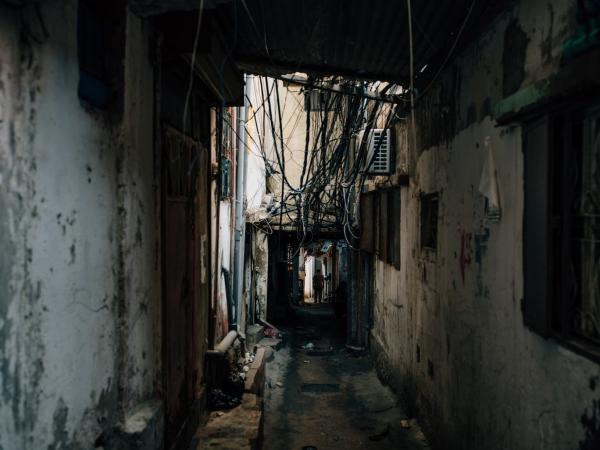
Wasim Dahmash da Palestina: Versi della Resistenza, EAST 1971

Palestinian refugee camp Bourj El Barajneh in Lebanon photo credit @ Paddy Dowling – The Independent
INNAMORATO DELLA PALESTINA
I tuoi occhi sono una spina nel cuore,
lacerano, ma li adoro.
La proteggo dalla tempesta
e la conficco, profonda, nella notte e nel dolore,
la ferita illumina migliaia di stelle,
trasforma il presente in un futuro
più caro del mio stesso essere.
Dimentico, quando i nostri occhi si incontrano,
che un tempo eravamo gemelli dietro il cancello.
Le tue parole erano la mia canzone:
ho tentato di cantare ancora
ma l'inverno si era posato sulle rosse labbra.
La rondine è volata via.
Le mie porte e la soglia invernale l'hanno seguita,
i nostri specchi si sono infranti, i dolori uniti,
abbiamo raccolto schegge di suoni
e abbiamo appreso a piangere la patria.
Lo pianteremo insieme,
sul petto di una chitarra;
lo suoneremo su tetti piangenti
alla luna distorta ed ai sassi,
ho dimenticato, mia solitaria, b stata la tua partenza
o la mia voce rotta ad arrugginire la chitarra?
Ti ho vista per l'ultima volta sulla banchina,
viaggiatore solitario senza bagaglio,
sono corso da te come un orfano che cerchi
una risposta nella saggezza ancestrale:
come può un frutteto relegato su una banchina
rimanere ancora verde?
Ho scritto:
stavo sulla banchina,
il vento soffiava,
avevamo solo la buccia di un arancio,
dietro di noi la sabbia infinita.
Ti ho vista su aguzze cime,
pastore senza pecore che correvi
e sulle rovine dove un tempo eri il ramo verde
io ero lo straniero che bussava al cancello,
i cancelli, le finestre e le pietre
riecheggianti.
Ti ho vista nei profondi pozzi,
ti ho vista nei granai, un volto infranto,
ti ho vista lavare i piatti nei caffè,
ti ho vista sull'ingresso di una grotta
appendere i tuoi stracci d'orfana,
ti ho vista sui comignoli, nelle strade,
ti ho vista fra le greggi, nel sangue che sgorga
dal sole,
riel sale del mare,
in ogni granello di sabbia
ed eri bella come la Terra.
Giuro,
tesserò per te un fazzoletto di ciglia
con parole più dolci del miele,
sei Palestinese
e lo rimarrai.
Ho spalancato le porte alla tempesta
e ho visto la luna di bronzo.
Ho camminato nei vicoli dove muore la luce
.
Vergine compagna, frumento fedele,
le nostre canzoni attraverseranno I’ aria
e pianteremo la fertilità nei semi intorpiditi.
Tu sarai sempre
la palma intrecciata del cuore
che non si piega sotto la tempesta e non sente i colpi del taglialegna
oltre le zanne dei lupi.
Palestinesi sono i tuoi occhi, il tuo tatuaggio,
Palestinesi i tuoi pensieri, i tuoi abiti,
i tuoi piedi, la tua forma,
Palestinesi le parole,
Palestinese la voce,
Palestinese tu vivi
Palestinese morrai.
Ti ho nei miei libri
fuoco delle mie canzoni,
il mio grido echeggia nel tuo nome:
un tempo ho incontrato i cavalli romani
un tempo ho distrutto gli alti idoli:
zoccoli e pietre, attenti:
ii fulmine ha abbattuto la selce.
Che i vermi mangino il mio corpo:
le formiche non generano le aquile
e i serpenti generano altri serpenti.
I tuoi occhi sono una spina nel cuore,
lacerano, ma li adoro.
La proteggo dalla tempesta
e la conficco, profonda, nella notte e nel dolore,
la ferita illumina migliaia di stelle,
trasforma il presente in un futuro
più caro del mio stesso essere.
Dimentico, quando i nostri occhi si incontrano,
che un tempo eravamo gemelli dietro il cancello.
Le tue parole erano la mia canzone:
ho tentato di cantare ancora
ma l'inverno si era posato sulle rosse labbra.
La rondine è volata via.
Le mie porte e la soglia invernale l'hanno seguita,
i nostri specchi si sono infranti, i dolori uniti,
abbiamo raccolto schegge di suoni
e abbiamo appreso a piangere la patria.
Lo pianteremo insieme,
sul petto di una chitarra;
lo suoneremo su tetti piangenti
alla luna distorta ed ai sassi,
ho dimenticato, mia solitaria, b stata la tua partenza
o la mia voce rotta ad arrugginire la chitarra?
Ti ho vista per l'ultima volta sulla banchina,
viaggiatore solitario senza bagaglio,
sono corso da te come un orfano che cerchi
una risposta nella saggezza ancestrale:
come può un frutteto relegato su una banchina
rimanere ancora verde?
Ho scritto:
stavo sulla banchina,
il vento soffiava,
avevamo solo la buccia di un arancio,
dietro di noi la sabbia infinita.
Ti ho vista su aguzze cime,
pastore senza pecore che correvi
e sulle rovine dove un tempo eri il ramo verde
io ero lo straniero che bussava al cancello,
i cancelli, le finestre e le pietre
riecheggianti.
Ti ho vista nei profondi pozzi,
ti ho vista nei granai, un volto infranto,
ti ho vista lavare i piatti nei caffè,
ti ho vista sull'ingresso di una grotta
appendere i tuoi stracci d'orfana,
ti ho vista sui comignoli, nelle strade,
ti ho vista fra le greggi, nel sangue che sgorga
dal sole,
riel sale del mare,
in ogni granello di sabbia
ed eri bella come la Terra.
Giuro,
tesserò per te un fazzoletto di ciglia
con parole più dolci del miele,
sei Palestinese
e lo rimarrai.
Ho spalancato le porte alla tempesta
e ho visto la luna di bronzo.
Ho camminato nei vicoli dove muore la luce
.
Vergine compagna, frumento fedele,
le nostre canzoni attraverseranno I’ aria
e pianteremo la fertilità nei semi intorpiditi.
Tu sarai sempre
la palma intrecciata del cuore
che non si piega sotto la tempesta e non sente i colpi del taglialegna
oltre le zanne dei lupi.
Palestinesi sono i tuoi occhi, il tuo tatuaggio,
Palestinesi i tuoi pensieri, i tuoi abiti,
i tuoi piedi, la tua forma,
Palestinesi le parole,
Palestinese la voce,
Palestinese tu vivi
Palestinese morrai.
Ti ho nei miei libri
fuoco delle mie canzoni,
il mio grido echeggia nel tuo nome:
un tempo ho incontrato i cavalli romani
un tempo ho distrutto gli alti idoli:
zoccoli e pietre, attenti:
ii fulmine ha abbattuto la selce.
Che i vermi mangino il mio corpo:
le formiche non generano le aquile
e i serpenti generano altri serpenti.
inviata da Riccardo Gullotta - 10/4/2021 - 08:09
Lingua: Italiano
Traduzione italiana #2 / الترجمة الإيطالية / Italian translation / Traduction italienne / תרגום לאיטלקית / Italiankielinen käännös :
violettanet
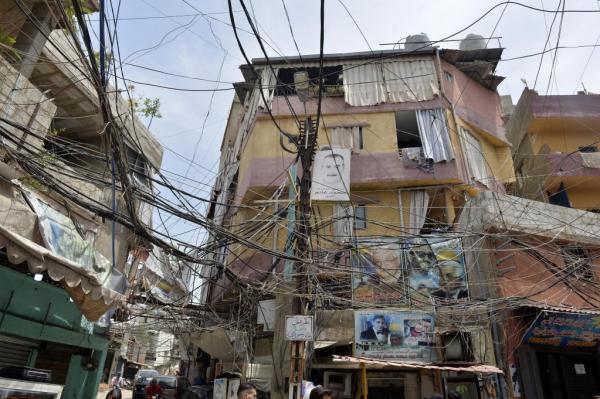
violettanet

Palestinian refugee camp Bourj El Barajneh in Lebanon photo credit @ EPA / Wael Hamzeh
INNAMORATO DELLA PALESTINA
I tuoi occhi sono una spina nel cuore
lacerano, ma li adoro.
Li proteggo dal vento
e li conficco nella notte e nel dolore
cosi la sua ferita illumina le stelle,
trasforma il presente in futuro
più caro della mia anima.
Dimentico qualche tempo dopo
quando i nostri occhi si incontrano
che una volta eravamo
insieme, dietro il cancello.
Le tue parole erano una canzone
che io tentavo di cantare ancora,
ma la tribolazione si era posata
sulle fiorenti labbra.
Le tue parole come la rondine
volarono via da casa mia
volarono anche la nostra porta
e la soglia autunnale
inseguendo te,
dove si dirigono le passioni ….
I nostri specchi si sono infranti
la tristezza ha compiuto 2000 anni,
abbiamo raccolto le schegge del suono
e abbiamo imparato a piangere la patria.
La pianteremo insieme,
nel petto di una chitarra;
la suoneremo sui tetti della diaspora
alla luna sfigurata ed ai sassi.
Ma ho dimenticato,
oh tu dalla voce sconosciuta !
Ho dimenticato,
è stata la tua partenza
ad arrugginire la chitarra,
o è stato il mio silenzio ?
Ti ho vista ieri al porto
viaggiatore senza provviste … senza famiglia.
Sono corso da te come un orfano
chiedendo alla saggezza degli antenati:
perché trascinare il giardino verde
in prigione, in esilio, verso il porto
se rimane, malgrado il viaggio,
l’odore del sale e dello struggimento,
sempre verde?
Ho scritto sulla mia agenda:
amo l’arancio e odio il porto,
ho aggiunto sulla mia agenda:
al porto mi fermai
la vita aveva occhi d’inverno,
avevamo le bucce dell’arancio
e dietro di me la sabbia era infinita!
Ti ho vista su aguzze cime,
pastore senza pecore che correvi
e sulle rovine dove un tempo eri il ramo verde
io ero lo straniero che bussava al cancello,
i cancelli, le finestre e le Pietre
riecheggianti.
Ti ho vista nei profondi pozzi,
ti ho vista nei granai, un volto infranto,
ti ho vista lavare i piatti nei caffè,
…
ti ho vista sull'ingresso di una grotta
appendere i tuoi stracci d'orfana,
ti ho vista sui comignoli, nelle strade,
ti ho vista fra le greggi, nel sangue che sgorga
dal sole,
riel sale del mare,
in ogni granello di sabbia
ed eri bella come la Terra.
…
Giuro, tesserò per te
un fazzoletto di ciglia
scolpirò poesie per i tuoi occhi
con parole più dolce del miele
scriverò “sei palestinese e lo rimarrai”
Ho spalancato le porte alla tempesta
e ho visto la luna di bronzo
….
Ho camminato nei vicoli dove muore la luce.
…
Vergine compagna,
…
frumento fedele,
le nostre canzoni attraverseranno I’ aria
e pianteremo la fertilità nei semi intorpiditi.
Tu sarai sempre
la palma intrecciata del cuore
che non si piega sotto la tempesta e non sente
oltre le zanne dei lupi.
[…]
Palestinesi sono i tuoi occhi, il tuo tatuaggio,
Palestinesi i tuoi pensieri, i tuoi abiti,
i tuoi piedi, la tua forma,
Palestinesi le parole,
Palestinese la voce,
Palestinese tu vivi
Palestinese morrai.
Ti ho nei miei libri
fuoco delle mie canzoni,
il mio grido echeggia nel tuo nome:
un tempo ho incontrato i cavalli romani
un tempo ho distrutto gli alti idoli:
zoccoli e pietre, attenti:
il fulmine ha abbattuto la selce.
…
Che i vermi mangino il mio corpo:
le formiche non generano le aquile
e i serpenti generano altri serpenti.
…
I tuoi occhi sono una spina nel cuore
lacerano, ma li adoro.
Li proteggo dal vento
e li conficco nella notte e nel dolore
cosi la sua ferita illumina le stelle,
trasforma il presente in futuro
più caro della mia anima.
Dimentico qualche tempo dopo
quando i nostri occhi si incontrano
che una volta eravamo
insieme, dietro il cancello.
Le tue parole erano una canzone
che io tentavo di cantare ancora,
ma la tribolazione si era posata
sulle fiorenti labbra.
Le tue parole come la rondine
volarono via da casa mia
volarono anche la nostra porta
e la soglia autunnale
inseguendo te,
dove si dirigono le passioni ….
I nostri specchi si sono infranti
la tristezza ha compiuto 2000 anni,
abbiamo raccolto le schegge del suono
e abbiamo imparato a piangere la patria.
La pianteremo insieme,
nel petto di una chitarra;
la suoneremo sui tetti della diaspora
alla luna sfigurata ed ai sassi.
Ma ho dimenticato,
oh tu dalla voce sconosciuta !
Ho dimenticato,
è stata la tua partenza
ad arrugginire la chitarra,
o è stato il mio silenzio ?
Ti ho vista ieri al porto
viaggiatore senza provviste … senza famiglia.
Sono corso da te come un orfano
chiedendo alla saggezza degli antenati:
perché trascinare il giardino verde
in prigione, in esilio, verso il porto
se rimane, malgrado il viaggio,
l’odore del sale e dello struggimento,
sempre verde?
Ho scritto sulla mia agenda:
amo l’arancio e odio il porto,
ho aggiunto sulla mia agenda:
al porto mi fermai
la vita aveva occhi d’inverno,
avevamo le bucce dell’arancio
e dietro di me la sabbia era infinita!
Ti ho vista su aguzze cime,
pastore senza pecore che correvi
e sulle rovine dove un tempo eri il ramo verde
io ero lo straniero che bussava al cancello,
i cancelli, le finestre e le Pietre
riecheggianti.
Ti ho vista nei profondi pozzi,
ti ho vista nei granai, un volto infranto,
ti ho vista lavare i piatti nei caffè,
…
ti ho vista sull'ingresso di una grotta
appendere i tuoi stracci d'orfana,
ti ho vista sui comignoli, nelle strade,
ti ho vista fra le greggi, nel sangue che sgorga
dal sole,
riel sale del mare,
in ogni granello di sabbia
ed eri bella come la Terra.
…
Giuro, tesserò per te
un fazzoletto di ciglia
scolpirò poesie per i tuoi occhi
con parole più dolce del miele
scriverò “sei palestinese e lo rimarrai”
Ho spalancato le porte alla tempesta
e ho visto la luna di bronzo
….
Ho camminato nei vicoli dove muore la luce.
…
Vergine compagna,
…
frumento fedele,
le nostre canzoni attraverseranno I’ aria
e pianteremo la fertilità nei semi intorpiditi.
Tu sarai sempre
la palma intrecciata del cuore
che non si piega sotto la tempesta e non sente
oltre le zanne dei lupi.
[…]
Palestinesi sono i tuoi occhi, il tuo tatuaggio,
Palestinesi i tuoi pensieri, i tuoi abiti,
i tuoi piedi, la tua forma,
Palestinesi le parole,
Palestinese la voce,
Palestinese tu vivi
Palestinese morrai.
Ti ho nei miei libri
fuoco delle mie canzoni,
il mio grido echeggia nel tuo nome:
un tempo ho incontrato i cavalli romani
un tempo ho distrutto gli alti idoli:
zoccoli e pietre, attenti:
il fulmine ha abbattuto la selce.
…
Che i vermi mangino il mio corpo:
le formiche non generano le aquile
e i serpenti generano altri serpenti.
…
inviata da Riccardo Gullotta - 10/4/2021 - 08:12
@ Riccardo Gullotta
alcune delle canzoni di Mahmud Darwish / محمود درويش che hai citato nell'introduzione sono presenti in versioni italiane:
Morto n°18
Oltre all'intero disco Nuovo cantacronache 6 dedicato a traduzioni italiane di Darwish. Non è che potresti aiutarci coi testi originali?
[2020]
Nuovo Cantacronache 6. Esilio, Esodo, Eccidio, Erranza…
Testi/ lyrics: Beppe Chierici
Musica / Music / Musique / Sävel: Giuseppe Mereu (Doc Pippus)
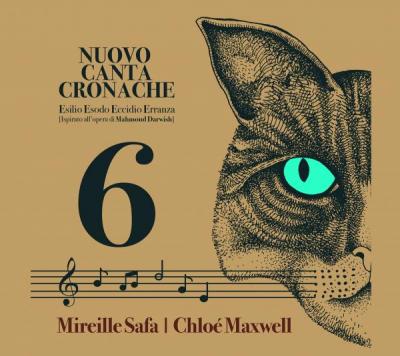
Questo disco richiede un esercizio di immaginazione. Proiettatevi in una qualunque cittadina mediterranea, meglio se lambita da questo mare, che a guardarlo da est sembra poi più un golfo che un mare. Ci siete? Bene. Ora date aria alle vostre gambe, vagabondate in qualche vicolo fuori dalle rotte turistiche. Vi chiedo di prediligere, potendo scegliere, quelli in cui scorgete panni stesi ad asciugare, tra muro e muro, casa e casa, famiglia e famiglia. Panni che sono già un trattato non scritto, ma ben più saldo, di amicizia. Ecco, ora fermatevi un attimo: vi siete accorti che da una delle finestre esce una voce di donna, una voce fuori dal tempo, una voce che fluisce con naturale noncuranza, così come di chi canti facendo altro. Non potete che restare ancora un poco e tendere voi stessi, non dico l’orecchio, dico proprio voi stessi, tutto quello che siete, verso quella finestra. Quelle canzoni, quelle note, quelle parole sono lì per voi. Sono melodie che vi sembra di aver sempre sentito, eppure ve le siete scordate, persi in altri traffici, in altre frettolose incombenze, tutte le volte che avete cercato disperatamente di sentirvi contemporanei. Per questo siete ancora lì, a seguire con il pensiero queste canzoni che invece non hanno né fretta di finire presto nei 3 minuti a cui vi hanno abituato le vostre radio, né paura di non essere alla moda. Talvolta riconoscete un’altra voce, vi sembra che abbia una certa aria di familiarità con la prima, potrebbe essere la figlia, azzardate. Intanto le parole vi stanno raccontando storie antiche, ma che a voi sembrano così nitidamente chiare, vive. Vi dicono di Gerusalemme e del suo strazio, di lampioni in lutto per una città che va in fiamme, di un mondo che rotola giù verso il suo oscuro precipizio, ma anche di padri e di madri, di amori difficili, di religioni in guerra che, prima ancora degli altri, uccidono sé stesse. Soprattutto vi parlano di esilio, quello che da secoli, ovunque, i vincitori impongono ai perdenti, quello che diventa un destino da trascinarsi dietro, sempre, ovunque. Voi non siete esiliati, i vostri bimbi a scuola devono temere solo brutti voti, non una bomba che in un attimo spazzi via tutto, eppure quelle canzoni, lo sentite bene, vi stanno dicendo qualcosa di voi, di chi eravate, e di chi siete. Forse, chissà, anche di chi sarete. Perché quelle di Mireille Safa e di sua figlia Chloé sono voci di rabdomanti: attraverso l’intensa poesia di Mahmoud Darwish, poeta palestinese amorevolmente volto in italiano dal grande vecchio Beppe Chierici, esse sembrano risvegliare qualcosa in voi, sono venute a cercarvi. Lasciatevi trovare.
cenacolodiares
alcune delle canzoni di Mahmud Darwish / محمود درويش che hai citato nell'introduzione sono presenti in versioni italiane:
Morto n°18
Oltre all'intero disco Nuovo cantacronache 6 dedicato a traduzioni italiane di Darwish. Non è che potresti aiutarci coi testi originali?
[2020]
Nuovo Cantacronache 6. Esilio, Esodo, Eccidio, Erranza…
Testi/ lyrics: Beppe Chierici
Musica / Music / Musique / Sävel: Giuseppe Mereu (Doc Pippus)

Andalusia - Chi sono io senza l'esilio - I nostri nomi - I lampioni delle strade sono in lutto - Il soldato che sognava - Beirut - Un sedile sul treno - La scuola di Gaza - Il mare ci dichiarerà la guerra - Mia madre - Mio padre - Gerusalemme - La corda della mia mandola - Poema per un amore antico - Passi nella notte
Questo disco richiede un esercizio di immaginazione. Proiettatevi in una qualunque cittadina mediterranea, meglio se lambita da questo mare, che a guardarlo da est sembra poi più un golfo che un mare. Ci siete? Bene. Ora date aria alle vostre gambe, vagabondate in qualche vicolo fuori dalle rotte turistiche. Vi chiedo di prediligere, potendo scegliere, quelli in cui scorgete panni stesi ad asciugare, tra muro e muro, casa e casa, famiglia e famiglia. Panni che sono già un trattato non scritto, ma ben più saldo, di amicizia. Ecco, ora fermatevi un attimo: vi siete accorti che da una delle finestre esce una voce di donna, una voce fuori dal tempo, una voce che fluisce con naturale noncuranza, così come di chi canti facendo altro. Non potete che restare ancora un poco e tendere voi stessi, non dico l’orecchio, dico proprio voi stessi, tutto quello che siete, verso quella finestra. Quelle canzoni, quelle note, quelle parole sono lì per voi. Sono melodie che vi sembra di aver sempre sentito, eppure ve le siete scordate, persi in altri traffici, in altre frettolose incombenze, tutte le volte che avete cercato disperatamente di sentirvi contemporanei. Per questo siete ancora lì, a seguire con il pensiero queste canzoni che invece non hanno né fretta di finire presto nei 3 minuti a cui vi hanno abituato le vostre radio, né paura di non essere alla moda. Talvolta riconoscete un’altra voce, vi sembra che abbia una certa aria di familiarità con la prima, potrebbe essere la figlia, azzardate. Intanto le parole vi stanno raccontando storie antiche, ma che a voi sembrano così nitidamente chiare, vive. Vi dicono di Gerusalemme e del suo strazio, di lampioni in lutto per una città che va in fiamme, di un mondo che rotola giù verso il suo oscuro precipizio, ma anche di padri e di madri, di amori difficili, di religioni in guerra che, prima ancora degli altri, uccidono sé stesse. Soprattutto vi parlano di esilio, quello che da secoli, ovunque, i vincitori impongono ai perdenti, quello che diventa un destino da trascinarsi dietro, sempre, ovunque. Voi non siete esiliati, i vostri bimbi a scuola devono temere solo brutti voti, non una bomba che in un attimo spazzi via tutto, eppure quelle canzoni, lo sentite bene, vi stanno dicendo qualcosa di voi, di chi eravate, e di chi siete. Forse, chissà, anche di chi sarete. Perché quelle di Mireille Safa e di sua figlia Chloé sono voci di rabdomanti: attraverso l’intensa poesia di Mahmoud Darwish, poeta palestinese amorevolmente volto in italiano dal grande vecchio Beppe Chierici, esse sembrano risvegliare qualcosa in voi, sono venute a cercarvi. Lasciatevi trovare.
cenacolodiares
CCG/AWS Staff - 10/4/2021 - 17:45
@ Staff
Impresa ardua per la mia oggettiva limitatezza di conoscenze e di mezzi. Ma, considerata la mia attenzione verso Darwish , il mio interesse per AWS e la mia stima verso lo Staff, l’invito non è declinabile e l’impresa quindi non può essere archiviata se non per cause di forza maggiore.
Impresa ardua per la mia oggettiva limitatezza di conoscenze e di mezzi. Ma, considerata la mia attenzione verso Darwish , il mio interesse per AWS e la mia stima verso lo Staff, l’invito non è declinabile e l’impresa quindi non può essere archiviata se non per cause di forza maggiore.
Riccardo Gullotta - 11/4/2021 - 10:33
@ Riccardo Gullotta
Ti ringraziamo infinitamente del tuo lavoro. Abbiamo inserito le traduzioni sulle rispettive pagine, così come spostato la traduzione inglese (e anche il testo arabo se riuscirai a reperirlo) direttamente in Morto n°18, in modo da rendere questa pagina, e le singole pagine delle canzoni più fruibili
Ti ringraziamo infinitamente del tuo lavoro. Abbiamo inserito le traduzioni sulle rispettive pagine, così come spostato la traduzione inglese (e anche il testo arabo se riuscirai a reperirlo) direttamente in Morto n°18, in modo da rendere questa pagina, e le singole pagine delle canzoni più fruibili
CCG/AWS Staff - 16/4/2021 - 18:46
×
![]()

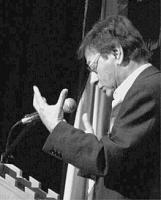


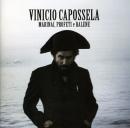
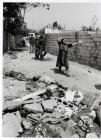


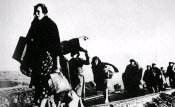
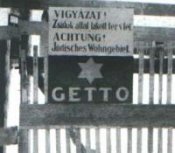
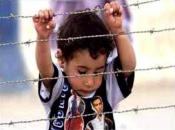
[1966]
شعر / Poesia / A Poem by / Poésie / שירה/ Runo :
Maḥmūd Darwīsh
موسيقى / Musica / Music / Musique / לחן / Sävel :
Samer Hegazy [ سامر حجازي ]
مطرب / Interpreti / Performed by / Interprétée par / שַׂחְקָן/ Laulavat :
Samer Hegazy [ سامر حجازي ] al piano, Basel Al-Debal [ باسل الدبال ] all’oud
Cenni sulle edizioni
Questa poesia fu composta da Darwish nel 1966. Quando Darwish sottopose Ashiq min filastin alla censura israeliana per l’autorizzazione alla pubblicazione, il censore cancellò la parola Palestina e la sostituì con Eretz Israel.
Il titolo è soprattutto noto per via delle raccolte omonime. La prima pubblicazione della raccolta in inglese fu curata dall’ intellettuale egiziano Abdel Wahab El Messiri. El Messiri fu professore di letteratura comparata, noto anche per la sua Enciclopedia degli Ebrei, dell’Ebraismo e del Sionismo / موسوعة اليهود واليهودية والصهيونية: نموذج تفسيري جديد e per la sua leadership del movimento riformista كفاية [Kifāya] che si oppose a Mubarak nel 2004. L’antologia di poesie palestinesi si intitola A lover from Palestine, and other poems per i tipi di Free Palestine Press, Washington D.C, 1970.
Le poesie di Darwish presenti in tale raccolta sono le seguenti:
- Waiting for the return
- My father أَنا يُوسفٌ يَا أَبِي .
- The roses and the dictionary
- Concerning hopes
- Promises from the Storm
- Victim no. 18
- To my grandfather
Nell’appendice a questa introduzione sono riportate le traduzioni in inglese delle poesie citate, che non sono facilmente reperibili.
L’antologia corrispondente in francese, Un amoureux de la Palestine, comprende le seguenti poesie: À ma mère / A mia madre, Poème sur un amour ancien / Poesia su un amore antico , Mon père / mio padre.
Con lo stesso titolo, A Lover from Palestine: An Anthology of Mahmoud Darwish Poetry, nel 2017 una gran parte di poesie, circa un centinaio, sono state raccolte e pubblicate in cinese dall’editore Hunan Literature & Art Publishing House a Pechino. Le traduzioni sono state curate da Xue Quing-Guo [ 薛庆国 ] , noto come Bassam, professore di Lingua e letteratura araba alla Foreign Studies University di Pechino e dal collega Tang Jun [ 唐俊 ]
Si propongono due esecuzioni, una di Samer Hegazy [ سامر حجازي ] al piano e Basel Al-Debal [ باسل الدبال ] all’oud che interpretano una parte del testo, la seconda é una recita integrale del testo.
Nota testuale sulle traduzioni
Il testo in arabo è scaricabile da questo sito. Sono presenti due traduzioni in inglese. La prima in ordine temporale e di autorevolezza è quella storica di Abdel Wahab El Messiri. Della seconda non è noto l’autore; la testata che l’ha pubblicata, The Nation Press Arab American News Network, è reputata. E’ a quest’ultima che fa riferimento la traduzione italiana pubblicata in vari siti in rete. Anche di questa non è dato sapere chi è il traduttore.
C’è un’altra traduzione in italiano del 1971 , che predilegiamo non soltanto perché a suo modo è un tassello di storia e di memorie di una stagione, ma per la sua freschezza. E’ una poesia sulla poesia. Il traduttore è Wasim Dahmash , siriano, studente all’epoca dei fatti. Oggi è ricercatore di Lingua e Letteratura araba presso la facoltà di Lingue e Letterature straniere dell’Università degli Studi di Cagliari, un filologo arabista di grande spessore. Si tratta di una di quelle traduzioni non frequenti, capaci di trasporre cultura e messaggi di una comunità nell’universo culturale di un’altra.
La seconda traduzione é stranamente affetta da lacune nella parte finale; non sono presenti tre intere strofe e alcuni versi. Li abbiamo segnalati per sommi capi in corsivo.
Le Palestine
Secondo il Piano di spartizione delle Nazioni Unite del 1947 il territorio del Mandato britannico di Palestina avrebbe dovuto essere diviso assegnando il 56% al nuovo Stato Ebraico, il 43% allo Stato Arabo [Palestinese] e l’1% del distretto di Gerusalemme all’ Amministrazione internazionale dell’Onu per un periodo limitato. Il piano non venne mai attuato per il rifiuto da parte araba che sfociò nella guerra del 1947. La superficie totale del territorio del Mandato era di 26.625 kmq. Tenuto conto della superficie del Corpus Separatum di Gerusalemme pari a 258 kmq, al nuovo stato palestinese sarebbe dovuto competere un territorio di circa 11.337 kmq. Oggi la superficie della Palestina, comprensiva del West Bank, Gerusalemme Est e Gaza ne conterebbe la metà,6.020 kmq. Il condizionale si impone in relazione alla questione delle numerose enclaves, terre assegnate ai coloni ebrei, che sembra non essere chiusa. I Palestinesi che abitano nei territori citati sono circa 5 milioni.
In realtà di Palestina ce n’è più di una. La diaspora palestinese riguarda 5 milioni di profughi nel mondo registrati dalle Nazioni Unite. Di essi 1,5 milioni vivono in 58 campi profughi disseminati in Giordania, Libano, Siria, Gaza e West Bank. Da notare che oltre a quelli citati ci sono altri campi profughi in cui l’UNRWA [United Nations Relief and Works Agency for Palestine Refugees] non è attiva. Uno dei più critici e tristemente noto è quello di Yarmouk , periferia di Damasco.
Si può solo immaginare la condizione dei rifugiati palestinesi in Siria e in Libano negli ultimi anni con la miseria economica che affligge per le note vicende le popolazioni locali. La sopravvivenza fisica dei palestinesi in tali campi è a rischio sempre più crescente.
[Riccardo Gullotta]
APPENDICE
English translation / الترجمة الإنجليزية / Traduzione inglese / Traduction anglaise/ תרגום לאנגלית / Englanninkielinen käännös :
Translated by Dr. Yehia El-Ezaby, American University in Cairo
WAITING FOR THE RETURN
The huts of my beloved on the sand―
I am staying awake with the rain.
I am the son of Ulysses who waited for the mail from the North;
A sailor called him, yet he didn’t go.
He anchored the boats
And took to the highest mountain.
Rock! On which my father prayed,
Shelter revolutionaries.
I will not sell you for precious pearls,
Nor will I ever leave.
The voices of my beloved stride over the wind,
And overrun castles.
Wait for us, Mother, at the door,
We are coming back.
The time is ours;
The wind blows as the sailor will,
And the ship overpowers the tide.
What will you cook for us, Mother?
We are coming back.
They’ve looted the oil jars
And the flour sacks, too?
Then bring us the corn of our fields.
We are hungry.
____________________________________________
English translation / الترجمة الإنجليزية / Traduzione inglese / Traduction anglaise/ תרגום לאנגלית / Englanninkielinen käännös :
Translated by Abdel Wahab El Messiri
THE ROSES AND THE DICTIONARY
Be that as it may,
I must . . .
The poet must have a new toast
And new anthems.
Traversing a tunnel of incense
And pepper and ancient summer,
I carry the key to legends and ruined monuments of slaves.
I see history an old man
Tossing dice and gathering the stars.
Be that as it may,
I must refuse death
Even though my legends die.
In the rubble I rummage for light and new poetry.
Did you realize before today, my love,
That a letter in the dictionary is dull?
How do they live, all these words?
How do they grow? How do they spread?
We still water them with the tears of memories
And metaphors and sugar.
Be that as it may,
I must reject roses that spring
From a dictionary or a diwan.
Roses grow on the arms of a peasant, on the fists of a laborer,
Roses grow over the wounds of a warrior,
And on the face of a rock.
__________________________________________________
English translation / الترجمة الإنجليزية / Traduzione inglese / Traduction anglaise/ תרגום לאנגלית / Englanninkielinen käännös :
Translated by Naseer Hasan Aruri ; Edmund Ghareeb
CONCERNING HOPES
Don’t tell me:
I wish I were a baker in Algeria
To sing with a fighter.
Don’t tell me:
I wish I were a shepherd in Yemen
To sing for resurrection.
Don’t tell me:
I wish I were a waiter in Havana
To sing the victories of the oppressed.
Don’t tell me:
I wish I were a young porter in Aswan
To sing for the rocks.
The Nile will never flow into the Volga,
Nor will the Congo or the Jordan flow into the Euphrates.
Each river has its own springs,
Its own course and its own life.
Our land, my friend, is no barren land.
Each land gives birth in due time,
And each fighter will see the dawn.
__________________________________________________
English translation / الترجمة الإنجليزية / Traduzione inglese / Traduction anglaise/ תרגום לאנגלית / Englanninkielinen käännös :
Translated by Akhir al-Layl Nahar ,Damascus 1968
PROMISES FROM THE STORM
So let it be.
I have to refuse death,
To burn the tears of the bleeding songs,
To denude the olive trees
Of all fake branches.
If I am singing to joy
Beyond the eyelids of frightened eyes
That is because the Storm
Promised me wine,
New toasts
And rainbows;
And because the storm
Swept away the song of stupid birds
And artificial branches
From the trunks of standing trees.
So let it be.
I have to be broud
Of you wound of the sity,
O tableau of lightning
In our sad nights.
The street frowns at my face
But you protect me from the shadow and grudging looks.
I shall sing to joy
Beyond the eyelids of frightened eyes,
Since the storm has blown in my homeland
And promised me wine and rainbows.
_______________________________________________
English translation / الترجمة الإنجليزية / Traduzione inglese / Traduction anglaise/ תרגום לאנגלית / Englanninkielinen käännös :
Translated by Abdel Wahab El Messiri
TO MY GRANDFATHER
Face of my grandfather! Cheerless prophet!
What grave sent you forth,
Wearing a vest the colour of a blood-stained rock,
And a cloak the colour of a ditch?
Face of my grandfather! Cheerless prophet!
Sorrow of a field that carries the remains of the dead and olive
. . .trees and old winds,
What grave sent you forth
To turn me into a lifeless statue?
Glory be to Allah. I haven’t sold an inch and never have I
. . .succumbed to oppression.
They danced and sang on your grave, yet sleep
For I am awake, awake I am till death.
___________________________________________